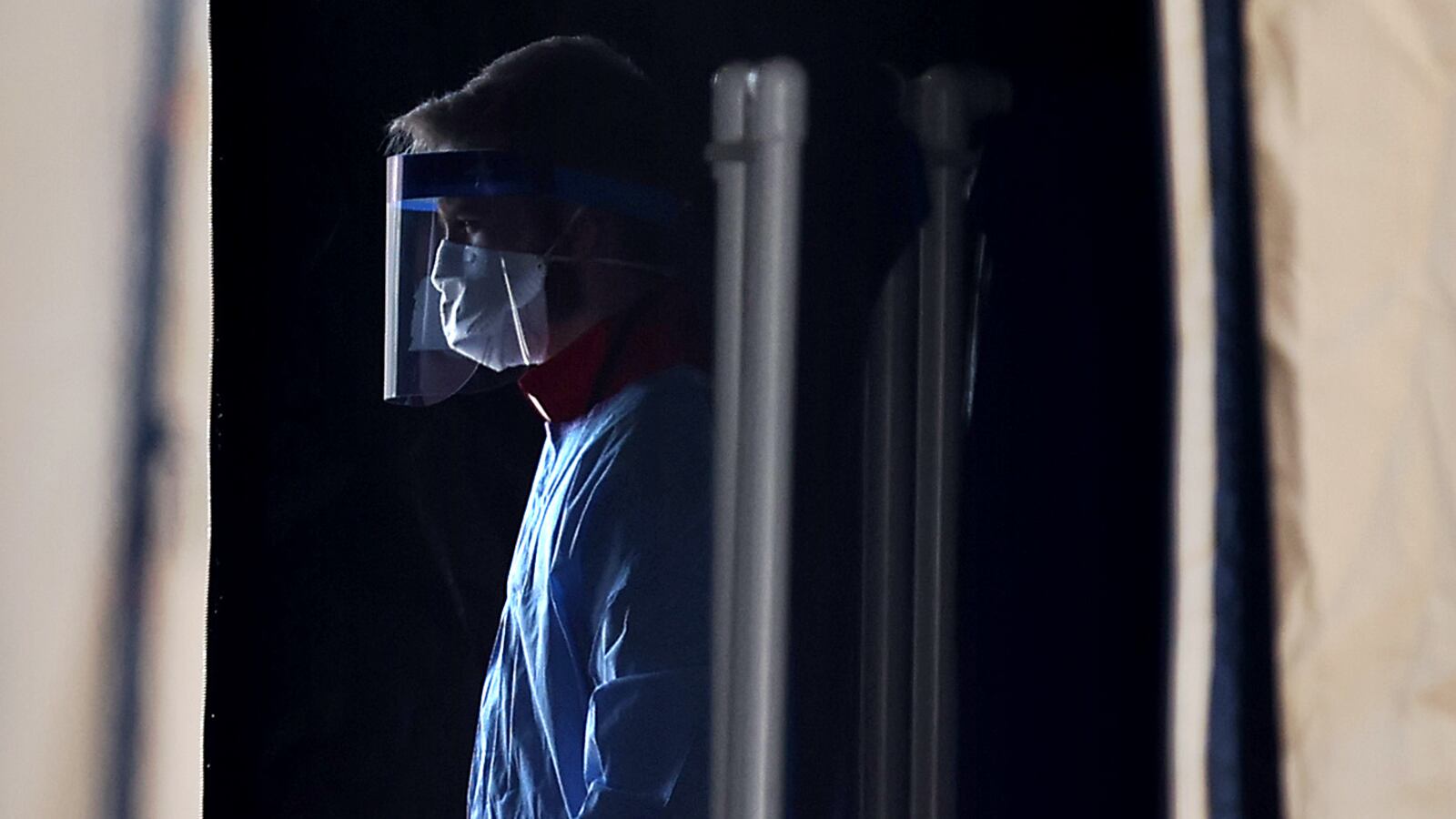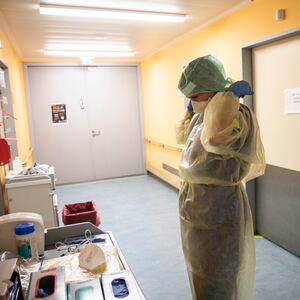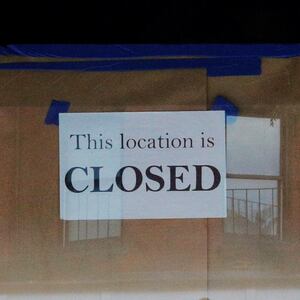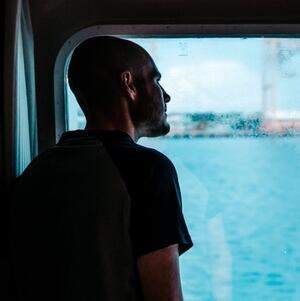State officials across the country are scrambling to enact new restrictions to curtail the spread of the deadly coronavirus as hospitals struggle with a tidal wave of new patients, as the U.S. crossed the threshold of more than 11 million total cases.
Over the last two weeks, a slew of states—from Michigan and the Dakotas to New Jersey—have seen an alarming wave of COVID-19 cases in a new surge that has accelerated faster than ever since the pandemic hit in America in March. On Sunday, researchers at Johns Hopkins University reported the latest ominous milestone: 11 million Americans have now been infected by the highly contagious virus, a record hit a mere six days after the nation notched its 10 millionth case.
Now, at least 45 states have reported all-time high case numbers in the past week—a figure that is sure to only increase as public-health officials insist COVID-19 will only worsen as winter and the holiday season looms.
Over the weekend, several states announced new restrictions to slow the spread of the virus that has already killed more than 246,000 U.S. residents, from a stay-at-home order in Chicago to mask mandates in at least four states.
These new restrictions, however, may already be too late in several areas where hospital systems are filled to capacity and understaffed, including North Dakota, where COVID-positive nurses have now been allowed to return to work due to a desperate nee[>?n dozens of states, North Dakota’s daily average for new cases, hospitalizations, and deaths put it at the top, according to ProPublica.
In addition to the mask mandate, a policy Burgum had previously refused, the governor also announced a four-week pause in activities to help keep schools open to in-person instruction. The move comes after his controversial announcement last week to allow asymptomatic nurses to continue to work to combat the flood of cases overwhelming the mostly rural hospital system.
And according to Forbes, South Dakota is one of the 10 riskiest states to visit after the Harvard-Brown risk-assessment tool reported 154.5 new daily COVID-19 cases per 100,000 people on a weekly average. Despite numerous grim mileposts, South Dakota Gov. Kristi Noem has repeatedly refused calls for a mask mandate.
The North Dakota Department of Health on Monday reported 10,900 active COVID-19 cases in the state of some 762,000 residents, with a test-positivity rate of about 19 percent. Earlier this month, the state had 171 coronavirus cases per 100,000 people, the highest per capita rate in the country, according to the CDC.
Utah and Ohio have also seen surges in cases, prompting state leaders to set new standards for mask-use. In Utah, where one local hospital over the weekend was flooded with conspiracy theorists trying to gain access over unfounded rumors that the ICU was not at near-capacity due to COVID-19, officials have instituted a mask mandate. In Ohio, a strict mask mandate has been implemented for businesses.
In addition to the masks, residents in Utah—a state that also saw record COVID-19 cases, deaths, and hospitalizations over the weekend—will now have to limit their holiday gatherings to those in the same household, and stop all school-sanctioned extracurricular activities. Bars are also required to stop serving alcohol at 10 p.m., a restriction that has also been implemented in New York City.
In Michigan, Gov. Gretchen Whitmer on Sunday ordered all high schools and colleges to shift to remote learning for at least three weeks, closed restaurants for indoor dining, and suspended all organized sports. In Washington state, Gov. Jay Inslee on Sunday also revealed new restrictions on businesses and social gatherings as the holiday season approaches, including closing indoor dining services and some entertainment centers.
“The situation has never been more dire,” Whitmer said at a Sunday press conference. “We are at the precipice and we need to take some action.”
In response to Michigan’s new measures, Scott Atlas, the president’s controversial coronavirus adviser who is a neuroradiologist and has no background in infectious diseases, tweeted: “The only way this stops is if people rise up. You get what you accept.” Whitmer responded with her shock at Atlas’ disregard for public health in a crisis and said she “wouldn’t be bullied” by the onetime Fox News pundit and close adviser of President Donald Trump.
State officials in New Jersey also revealed Monday that the number of people allowed to gather has been limited to combat the COVID-19 surge. New Jersey Gov. Phil Murphy said private indoor gatherings could now only consist of 10 people, while outside gatherings would be limited to 150 people—distanced and with masks encouraged. The news comes after cases in New Jersey soared over the weekend, with nearly 9,000 newly reported infections over the two-day period—numbers even higher than the Garden State reached during the worst of the crisis in April and May.
Maryland has also scaled back its indoor dining and gathering limitations, with the state now banning in-person services for nonessential businesses. Oregon officials have also closed indoor dining and limited social gatherings to no more than six people. Philadelphia on Monday also announced a slew of new restrictions, including no indoor gatherings and reducing outdoor dining to four family members maximum.
“It’s gotten worse and it’s gonna get worse,” Murphy said on MSNBC on Monday morning. “So we’ve got to be honest with folks. Particularly with cold-weather… with the holidays, this is going to get worse. Please God, it doesn’t get to the [fatality] levels that we saw in the spring.”
Perhaps the most intense measure, however, was enacted in Chicago, where officials announced a new stay-at-home order that took effect Monday after cases surged so much in the city that one in 18 residents has been infected by the deadly virus. However, unlike the lockdown restrictions from earlier this year, Chicago’s restaurants will remain open for outdoor dining and delivery. New Mexico has also issued a statewide, two-week lockdown.
Despite all the new measures states seem to be taking to ensure the deadly virus does not completely upend the American health system, Michael Osterholm, an adviser to President-elect Joe Biden, is terrified the virus is set to only get worse.
“My worst fear is we will see what we saw happening in other countries, where people were dying on the streets,” Osterholm said on NBC’s Meet the Press. “The health-care system is breaking, literally breaking.”










